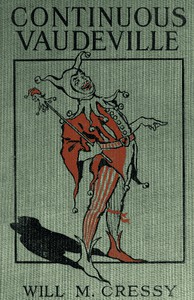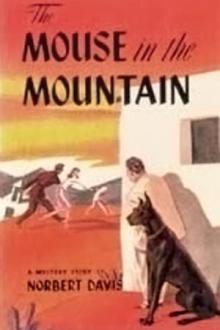Continuous Vaudeville, Will M. Cressy [top 10 inspirational books TXT] 📗

- Author: Will M. Cressy
Book online «Continuous Vaudeville, Will M. Cressy [top 10 inspirational books TXT] 📗». Author Will M. Cressy
In the "George Washington, Jr.," Company there was a young lady who laid great stress on the refined atmosphere in which she had been brought up. Everything in her home had been just a little more refined than any one else had ever enjoyed. One day at the table the subject of coffee-drinking came up; some thought it harmful, others did not; finally Carter De Haven asked this young lady what she thought about it.
"Well," she said, in her precise way, "I don't think it hurts anybody. I know Papa always drank five and six saucersful every morning, and it never hurt him."
[130]
THE OLD SHIP OF ZIONOld Dennie O'Brion had looked upon the wine when it was red in the cup so long that he was about down and out; no one would hire him any more, even in the most menial capacity. His poor, hard-working wife had at last taken the pledge not to support him any longer in idleness, so it was up to Dennie to do something desperate. The most desperate thing he could think of was to swear off. So before the priest he took a solemn vow not to touch a drop of liquor for one year.
And he managed to retain his seat on the wagon splendidly—for thirty-six hours.
On the evening of the second day Mrs. O'Brion, in appreciation of his desperate efforts to conquer the demon rum, took Dennie and their twelve-year-old-son Mickie to the theater. It was a rollicking, up-to-date, musical comedy. The boys and the girls of the chorus at the rise of the curtain gayly quaffed huge quantities of imag[131]inary wine from near-golden goblets. The Comedian was a jolly, jovial souse who never, during the first two acts, got sober but once, and then got into trouble by it.
The first act took place in a Parisian café, where the chorus men were all American millionaires buying wine for the Chorus Ladies.
The second act took place in a brewery, where the Comedian fell into a beer vat and was only saved by the number of champaign corks he had in his pockets, which acted as life preservers.
'Twas a fine play to take a man to who was only thirty-six hours on the water wagon.
At the end of the second act, when the Comedian had just been rescued from the beer vat, Dennie scrambled to his feet and began climbing for the aisle.
"Where are ye's goin', Dinnie?" asked Mrs. O'Brion anxiously.
"Let go me tail," says Dennie. "Me foot's asleep; I must get out." And tearing his coat-tail away he hurried up the aisle.
"Mickie, darlin'," said Mrs. O'Brion to her young hopeful, "follow your father! Don't let him get into a saloon! And if he does, stick to him! Bring him home! Hurry, now."
[132]Mickie hurried out and caught the old man just as he was making the swinging doors.
"Here, Father, Father, come out av that!" he cried, catching Dennie by that muchly pulled coat-tail.
"Oh, to h—— wit you!" says Dennie. "Go back to your mother!"
"But, Father, you promised the priest! You took a solemn vow not to touch liquor for a whole year."
"What av it?" says Dennie.
"Well, the year is not up," says Mickie.
"G'an!" says Dennie. "Go back to school! read your program! Look," and Dennie pointed to the program which he still clasped in his hand; "read that! 'Two years elapses between the second and third acts.'"
Leaving the dumbfounded Mickie there on the sidewalk, Dennie hurried into the saloon; but he did not hurry out. Meanwhile Mrs. O'Brion went home and Mickie waited at the door.
An hour later Dennie came out—endways. With a number nine boot just behind him. Mickie tenderly assisted his father to his feet and started him homeward. Dennie had now reached the[133] crying stage; nobody loved him; he thought he should commit suicide; in the morning.
Now it so happened that on this night the Salvation Army were conducting an all-night session at their barracks. Dennie and Mickie had to pass these barracks on their way home. The lights and the music caught Dennie's wandering attention, and he insisted on going in. Mickie tried to tell him that it was no place for him, a good Catholic, but Dennie shook off his detaining hands and staggered into the hall, down the center aisle, tripped over an umbrella handle, and fell flat on his face right up against the platform. Mickie meanwhile stood back near the door horror-stricken.
The old, white-haired officer who was speaking as Dennie made his unexpected appearance at his feet, was quick to seize the opportunity and he delivered a beautiful and touching oration on the Heavenly hand that had guided the feet of this poor erring brother here to the Throne of Grace, and he finished up by saying,
"And now, brothers and sisters, let us all rise and sing that beautiful hymn, 'The Old Ship of Zion.'"
[134]Three minutes afterwards little Mickie burst into his own home and threw himself into his mother's arms, sobbing as if his heart was breaking.
"What is it, me darlin'; what is the matter? Where is your father?"
"He's dead; he's dead," sobbed Mickie. "He wint into the Salvation Army, and he fell onto the flure, and they all stood up and begun to sing—'The Ould Mick Is Dyin'!'"
From a letter published in The Player:
"The theater is a dump, owing to the unsanitary condition of the house and management."
Sat down on a tuffet
In Churchill's new Café.
A Pittsburger spied 'er
And sat down beside 'er
And they couldn't drive Miss Muffet away.
Special attention is called to the fact that this is the only collection of stories about actor folks[135] ever published, that does not have the one about the man in the spiked shoes stepping on the actor's meal ticket.
From an English Theatrical paper I clip the following names:
Price & Revost; Bumps the Bumps.
Niagara & Falls; French Acrobats.
Boston & Philadelphia.
Merry & Glad.
Willie Stoppit.
Nat Haines was playing poker; Laloo was one of the players. Laloo was a freak that came to this country some years ago, and at one time commanded a salary of a thousand dollars a week. He was a very handsome young fellow, but had growing out from his breast the body of a small female. He had no muscular control of this secondary body, but could take hold of its hands and arms and work them all about.
After they had been playing a while Nat discovered that Laloo was cheating; he said nothing at the time, simply throwing his hand down and passing out. But when the hand was over and[136] some one else was dealing, Nat leaned over to Laloo and said,
"Say, Kid; you do that again and I'll give your sister a kick in the neck."
[137]
FIREMAN, SAVE MY CHILDA comic opera company was playing Moose Jaw, Canada. I don't have to say what kind of a company it was. The fact that they were playing Moose Jaw is enough.
(And by the way, who knows how that town got its name? And a bright little boy at the foot of the class held up his hand and said—"I know!" And the teacher said, "All right, Willie, you may tell us how Moose Jaw got its name." And Willie said—"It is derived from an Indian expression which means, 'The-Place-Where-the-Man-Fixed-the-Wagon-With-a-Moose's-Jaw-Bone.'")
There was no regular theater there, so the company appeared in the fire station. The engines were run out in the street and the show was given there. There were big corridors on the second and third floors where the firemen slept; there was a brass rod running down from the upper to the[138] lower floor for the firemen to slide down in case of a fire. The firemen all slept up on the third floor this night, giving the second floor up to the ladies for a dressing room.
It was at the end of the first act. The girls were changing for the second act. The change was complete; tights and all. And an alarm was rung in. B-r-r-r-r!! went the big gong downstairs. And swish! swish! went the red-shirted firemen down the pole. The girls thought the firehouse itself was afire and ran shrieking around the room begging to be saved.
There were eighteen firemen upstairs that night and only two of them got to the fire.
On the stage of the Orpheum Theater in Montreal hangs this sign:
FIRE. YOU DO THE SMOKING AND
I'LL DO THE FIREING. MANAGER.
I came near leaving the stage while playing in Montreal and going into the portering business;[139] said change being suggested by the following advertisement in the Montreal Star:
"Wanted: A porter to drive bus and a dining room girl."
GOT ANY EXPERIENCED BABIES?
Wanted: Nursing; experienced babies. 10X Globe Office.—(Toronto Globe.)
[140]
PLAYING THE ENGLISH MUSIC HALLSAn American talking act going over to England to play has got a big job on hand. The trouble is going to come from a totally unexpected source too. It is because we do not speak the language. We say that we speak English; but we don't; that is, mighty little of it. We speak mostly plain, unadulterated, United States language, which is very different from English. So when we go over there, in addition to talking about things that they do not understand, we are also using a language that they don't know.
For instance: We opened up in Manchester with a play called The Wyoming Whoop. Now out of that title they understood just one word—"The." They did not know whether "Wyoming" was a battleship or some patent skin food. And "Whoop" was still worse.
During the progress of the play one of the[141] characters speaks of having left the day's ice on the steps all the forenoon; I say—
"Has that piece of ice been out in that Wyoming sun all the forenoon?"
"Yes, sir."
"Well, you take a sponge and go out and get it."
After two or three shows the manager came to me and asked me what that line about the ice meant; was it supposed to be funny? I told him it was in America. He wanted to know why.
"Well," I said, "you know Wyoming is the hottest place in America, don't you?"
"No; is it?"
"Well then, you know that if you left a piece of ice out in the sun all the forenoon it would melt, don't you?"
"No; would it?"
Upon investigation I found that there was probably not one person in ten thousand in those manufacturing towns of England who ever saw a piece of ice. They didn't know but that you could bake it.
It took me only three days to discover that I was in wrong with The Wyoming Whoop. So[142] the next week in Liverpool I switched to Bill Biffin's Baby. Now we were on the right track. We had a subject, Babies, that they understood and liked. But on the second show I began writing it over—into the English language. I found that in twenty-four minutes I was using thirty-two words that they either knew nothing of, or else meant something entirely different from what I intended they should.
For instance: Take the words Trolley Car. An American player spoke of having seen a lady riding on a trolley, and the audience went into fits. The player was astounded; he hadn't told his "gag" at all yet—(and, by the way, it isn't a "gag" there; it is a "wheeze")—and the audience was laughing. And then when he finally told his "gag" not a soul laughed. Upon investigation he found that over there what he meant by a trolley car was "a tram." And what they called a "trolley" was the baggage truck down at the railway station that they hauled trunks around on.
Another of their "gags" was—
"I saw you coming out of a saloon this morning."
[143]"Well, I couldn't stay in there all day, could I?"
Received with more chunks of silence.
He meant a place where they sold liquor. He should have said "a Pub."
A "saloon" there is a barber shop.
The ticket office is the booking office.
The ticket agent is the booking clerk (pronounced "clark").
A depot is the railway station.
You don't





Comments (0)